 W
WAIR is a cross-platform runtime system developed by Harman International for building desktop applications and mobile applications, programmed using Adobe Animate, ActionScript, and optionally Apache Flex. It was originally released in 2008. The runtime supports installable applications on Windows, macOS, and mobile operating systems, including Android, iOS and BlackBerry Tablet OS.
 W
WAndroid is a mobile operating system based on a modified version of the Linux kernel and other open source software, designed primarily for touchscreen mobile devices such as smartphones and tablets. Android is developed by a consortium of developers known as the Open Handset Alliance and commercially sponsored by Google. It was unveiled in November 2007, with the first commercial Android device launched in September 2008.
 W
WAppetizer is an open source dock for Windows 2000, XP, Vista and 7, which allows organizing the user's shortcuts and applications. It can be customized via skins and plugins and is available in 25 languages. Various other features are available including support for keyboard shortcuts, custom icons and tray icon support. Appetizer also features a function to automatically launch certain applications when it starts.
 W
WBleachBit is a free and open-source disk space cleaner, privacy manager, and computer system optimizer. The BleachBit source code is licensed under the GNU General Public License version 3.
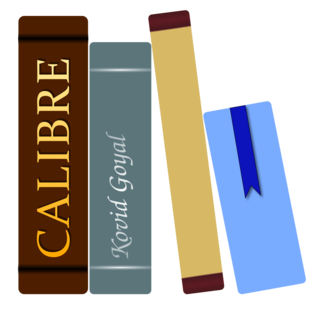 W
WCalibre is a cross-platform open-source suite of e-book software. Calibre supports organizing existing e-books into virtual libraries, displaying, editing, creating and converting e-books, as well as syncing e-books with a variety of e-readers. Editing books is supported for EPUB and AZW3 formats. Books in other formats like MOBI must first be converted to those formats, if they are to be edited.
 W
WApache Cassandra is a free and open-source, distributed, wide column store, NoSQL database management system designed to handle large amounts of data across many commodity servers, providing high availability with no single point of failure. Cassandra offers robust support for clusters spanning multiple datacenters, with asynchronous masterless replication allowing low latency operations for all clients. Cassandra offers the distribution design of Amazon DynamoDB with the data model of Google's Bigtable.
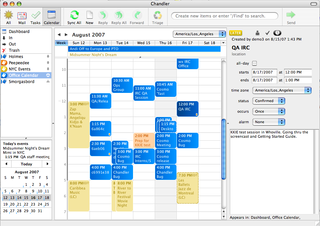 W
WChandler is a discontinued personal information management software suite described by its developers as a "Note-to-Self Organizer" designed for personal and small-group task management and calendaring. It is free software, previously released under the GNU General Public License, and now released under the Apache License 2.0. It is inspired by a PIM from the 1980s called Lotus Agenda, notable because of its "free-form" approach to information management. Lead developer of Agenda, Mitch Kapor, was also involved in the vision and management of Chandler.
 W
WChromium is a free and open-source software project developed by the Google-sponsored Chromium project. The source code can be compiled into a web browser.
 W
WDefraggler is a freemium defragmentation utility developed by Piriform, which can defragment individual files or groups of files on computer system. Defraggler runs on Microsoft Windows; it has support for all versions since Windows XP. It includes support for both IA-32 and x64 versions of these operating systems.
 W
WDirSync Pro is an open-source file synchronization and backup utility for Windows, Linux and macOS. DirSync Pro is based on the program Directory Synchronize (DirSync), which was first released in February 2003 by Elias Gerber. He subsequently developed it with Frank Gerbig and T. Groetzner. DirSync Pro was released by O. Givi in July 2008, based on a branch of the DirSync code. Many parts of DirSync Pro have gone through major rewriting and redesign ever since.
 W
WDuplicati is a backup client that securely stores encrypted, incremental, compressed remote backups of local files on cloud storage services and remote file servers. Duplicati supports not only various online backup services like OneDrive, Amazon S3, Backblaze, Rackspace Cloud Files, Tahoe LAFS, and Google Drive, but also any servers that support SSH/SFTP, WebDAV, or FTP.
 W
WERPNext is a free and open-source integrated Enterprise Resource Planning (ERP) software developed by Frappé Technologies Pvt. Ltd. and is built on MariaDB database system using a Python based server-side framework.
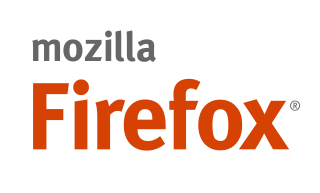 W
WMozilla Firefox 3.0 is a version of the Firefox web browser released on June 17, 2008 by the Mozilla Corporation.
 W
WFree Studio is a freeware set of multimedia programs developed by DVDVideoSoft. The programs are available in one integrated package and also as separate downloads.
 W
WFrostbite is a game engine developed by DICE, designed for cross-platform use on Microsoft Windows, seventh generation game consoles PlayStation 3 and Xbox 360, and eighth generation game consoles PlayStation 4 and Xbox One.
 W
WGoogle Chrome is a cross-platform web browser developed by Google. It was first released in 2008 for Microsoft Windows, and was later ported to Linux, macOS, iOS, and Android where it is the default browser built into the OS. The browser is also the main component of Chrome OS, where it serves as the platform for web applications.
 W
WGoogle Map Maker was a map editing service launched by Google in June 2008. In geographies where it is hard to find providers of good map data, user contributions were used to increase map quality. Changes to Google Map Maker were intended to appear on Google Maps only after sufficient review by Google moderators. Google Map Maker was used at Google Mapathon events held annually.
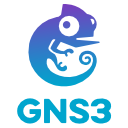 W
WGraphical Network Simulator-3 is a network software emulator first released in 2008. It allows the combination of virtual and real devices, used to simulate complex networks. It uses Dynamips emulation software to simulate Cisco IOS.
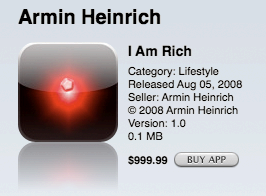 W
WI Am Rich is an iOS application developed by Armin Heinrich and which was distributed using the App Store. When launched, the screen only contains a glowing red gem and an icon that, when pressed, displays the following mantra in large text:I am richI deserv [sic] itI am good,healthy & successful
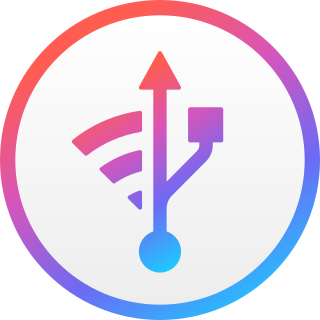 W
WiMazing is mobile device management software that allows users to transfer files and data between iOS devices and macOS or Windows computers.
 W
WImpulse was a digital distribution and multiplayer platform. Originally developed by Stardock to succeed Stardock Central, it was purchased by GameStop in March 2011, and was subsequently rebranded as GameStop PC Downloads, with the client being renamed GameStop App. The client was discontinued in April 2014.
 W
WInstapaper is a bookmarking service that allows web content to be saved so it can be "read later" on a different device, such as an e-reader, smartphone, or tablet. The service was founded in 2008 by Marco Arment and has around 2 million users as of late 2011. In April 2013, Marco sold a majority stake to Betaworks and by mid 2016 Pinterest acquired the company. In July 2018, ownership of Instapaper was transferred from Pinterest to a newly formed company Instant Paper, Inc. The transition was completed on August 6, 2018.
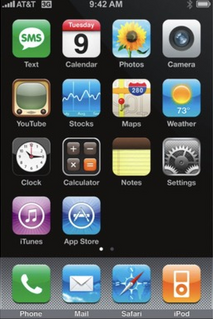 W
WiPhone OS 2 is the second major release of the iOS mobile operating system developed by Apple Inc., being the successor to iPhone OS 1. It was the first release of iOS to support third-party applications via the App Store. iPhone OS 2.2.1 was the final version of iPhone OS 2. It was succeeded by iPhone OS 3 on June 17, 2009.
 W
WJDownloader is a download manager, written in Java, which allows automatic download of groups of files from one-click hosting sites. JDownloader supports the use of premium accounts. Some parts, but not all, of JDownloader are open-source. In December 2009 the program's website was in the top 1000 visited websites of Spain. The German online magazine, Chip.de designated it "newcomer of the year" in 2009, after it ranked among the top 50 most downloaded applications, with over half a million downloads in a year.
 W
WKDE Software Compilation 4 was the only series of the so-called KDE Software Compilation, first released in January 2008 and the last release being 4.14.3 released in November 2014. It was the follow-up to K Desktop Environment 3. Following KDE SC 4, the compilation was broken up into basic framework libraries, desktop environment and applications, which are termed KDE Frameworks 5, KDE Plasma 5 and KDE Applications, respectively.
 W
WLife with PlayStation was an online multimedia application for the PlayStation 3 video game console on the PlayStation Network. The application had four channels, all of which revolved around a virtual globe that displayed information according to the channel. The application also included a client for Folding@home, a distributed computing project aimed at disease research. As of November 2012 the service has been discontinued.
 W
WLinux-libre is an operating system kernel and a GNU package.
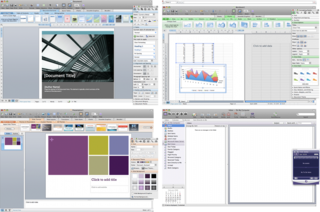 W
WMicrosoft Office 2008 for Mac is a version of the Microsoft Office productivity suite for Mac OS X. It supersedes Office 2004 for Mac and is the Mac OS X equivalent of Office 2007. Office 2008 was developed by Microsoft's Macintosh Business Unit and released on January 15, 2008. Office 2008 was followed by Microsoft Office for Mac 2011 released on October 26, 2010, requiring a Mac with an Intel processor and Mac OS version 10.5 or better. Office 2008 is also the last version to feature Entourage, which was replaced by Outlook in Office 2011. Microsoft stopped supporting Office 2008 on April 9, 2013.
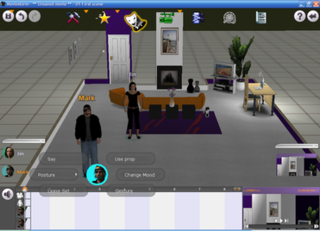 W
WMoviestorm is a real-time 3D animation app published by Moviestorm Ltd. The software is available to and used by people of all age groups and appeals to those with a diverse range of backgrounds and interests, from amateur and professional film makers, through to businesses and education, as well as people just looking to simply tell stories or create messages to share using video. Moviestorm enables the user to create animated movies, using machinima technology. It takes the user from initial concept to finished, distributed movies. Sets and characters can be created and customised, and scenes can be filmed using multiple cameras.
 W
WMusix GNU+Linux is a discontinued live CD and DVD Linux distribution for the IA-32 processor family based on Debian. It contained a collection of software for audio production, graphic design, video editing and general purpose applications. The initiator and co-director of the project was Marcos Germán Guglielmetti.
 W
WNim is an imperative, general-purpose, multi-paradigm, statically typed, systems, compiled programming language designed and developed by Andreas Rumpf. It is designed to be "efficient, expressive, and elegant", supporting metaprogramming, functional, message passing, procedural, and object-oriented programming styles by providing several features such as compile time code generation, algebraic data types, a foreign function interface (FFI) with C, C++, Objective-C, and JavaScript, as well as supporting compiling to C, C++, Objective-C, and JavaScript.
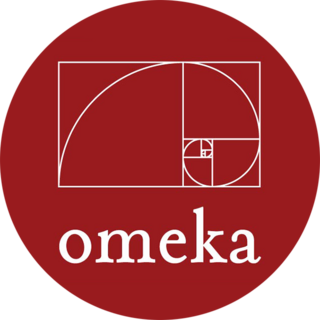 W
WOmeka is a free, open-source content management system for online digital collections. As a web application, it allows users to publish and exhibit cultural heritage objects, and extend its functionality with themes and plugins. A lightweight solution in comparison to traditional institutional repository software like DSpace and Fedora, Omeka has a focus on display and uses an unqualified Dublin Core metadata standard.
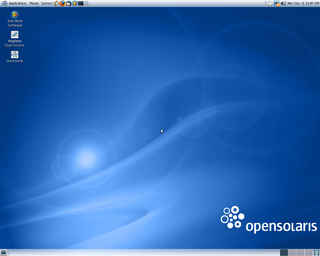 W
WOpenSolaris is a discontinued open source computer operating system based on Solaris and created by Sun Microsystems. It was also the name of the project initiated by Sun to build a developer and user community around the software. After the acquisition of Sun Microsystems in 2010, Oracle decided to discontinue open development of the core software, and replaced the OpenSolaris distribution model with the proprietary Solaris Express.
 W
WPhoronix Test Suite (PTS) is a free and open-source benchmark software for Linux and other operating systems which is developed by Michael Larabel and Matthew Tippett. The Phoronix Test Suite has been endorsed by sites such as Linux.com, LinuxPlanet, and Softpedia.
 W
WProxmox Virtual Environment is an open-source server virtualization management platform. It is a Debian-based Linux distribution with a modified Ubuntu LTS kernel and allows deployment and management of virtual machines and containers. Proxmox VE includes a web console and command-line tools, and provides a REST API for third-party tools. Two types of virtualization are supported: container-based with LXC, and full virtualization with KVM. It comes with a bare-metal installer and includes a web-based management interface.
 W
WPuddletag is a graphical audio file metadata editor ("tagger") for Unix-like operating systems.
 W
WPure, successor to the equational language Q, is a dynamically typed, functional programming language based on term rewriting. It has facilities for user-defined operator syntax, macros, arbitrary-precision arithmetic, and compiling to native code through the LLVM. Pure is free and open-source software distributed (mostly) under the GNU Lesser General Public License version 3 or later.
 W
WSafari is a graphical web browser developed by Apple, based on the WebKit engine. First released on desktop in 2003 with Mac OS X Panther, a mobile version has been bundled with iOS devices since the iPhone's introduction in 2007. Safari is the default browser on Apple devices. A Windows version was available from 2007 to 2012.
 W
WScoreloop, a subsidiary of BlackBerry, was a cross-platform social gaming network for the operating systems including BlackBerry, Android, Bada, iOS and Windows Phone 7.
 W
WSeaBIOS is an open-source implementation of a 16-bit x86 BIOS, serving as a freely available firmware for x86 systems. Aiming for compatibility, it supports standard BIOS features and calling interfaces that are implemented by a typical proprietary x86 BIOS. SeaBIOS can either run on bare hardware as a coreboot payload, or can be used directly in emulators such as QEMU and Bochs.
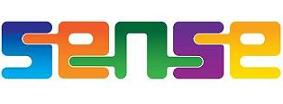 W
WSense is an educational programming environment created by The Open University (OU) in the United Kingdom. It uses a drag-and-drop programming environment designed to teach students the fundamentals of computer programming, using different shape and colour "blocks" selected from a palette of available commands, meaning that the student needs no prior experience of programming nor need to learn a syntax. It is based on the Scratch programming language developed by the MIT Media Lab, and uses .sb files like Scratch but the two pieces of software cannot use each other's files.
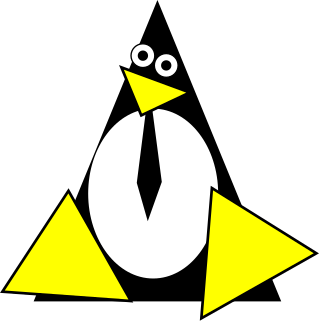 W
WSmack is a Linux kernel security module that protects data and process interaction from malicious manipulation using a set of custom mandatory access control (MAC) rules, with simplicity as its main design goal. It has been officially merged since the Linux 2.6.25 release, it was the main access control mechanism for the MeeGo mobile Operating System. It is also used to sandbox HTML5 web applications in the Tizen architecture, in the commercial Wind River Linux solutions for embedded device development, in Philips Digital TV products., and in Intel's Ostro OS for IoT devices.
 W
WSpectasia is a document browser (chooser) application that has been developed by MATT Services. Spectasia was first released as a Beta version for Microsoft Windows in July 2006, with the latest stable release on 23 March 2009.
 W
WSRWare Iron is a Chromium-based web browser developed by the German company SRWare. It primarily aims to eliminate usage tracking and other privacy-compromising functionality that the Google Chrome browser includes. Iron ships with certain Chromium privacy options switched on by default, it provides some additional features that distinguish it from Google Chrome.
 W
WThe Star Engine, formerly known as the Retro Engine, is a multiplatform game engine developed by Australian programmer Christian Whitehead, best known for its use in Sega's Sonic the Hedgehog series.
 W
WSteel is a discontinued freeware web browser developed by Michael Kolb under the name kolbysoft. It is a fork of the default browser for Android, taking its WebKit-based layout engine and providing what is intended to be an easier and more "touch friendly" user interface.
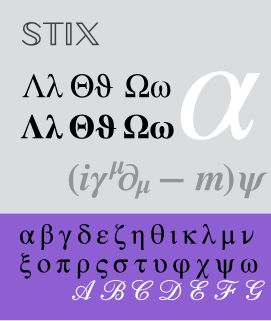 W
WThe STIX Fonts project, Scientific and Technical Information Exchange (STIX), is a project sponsored by several leading scientific and technical publishers to provide, under royalty-free license, a comprehensive font set of mathematical symbols and alphabets, intended to serve the scientific and engineering community for electronic and print publication. The STIX fonts are available as fully hinted OpenType/CFF fonts. There is currently no TrueType version of the STIX fonts available, but the STIX Mission Statement includes the intention to create one in the future. However, there exists an unofficial conversion of STIX Fonts to TrueType, suitable for use with software without OpenType support.
 W
WStockfish is a free and open-source chess engine, available for various desktop and mobile platforms. It is developed by Marco Costalba, Joona Kiiski, Gary Linscott, Tord Romstad, Stéphane Nicolet, Stefan Geschwentner, and Joost VandeVondele, with many contributions from a community of open-source developers.
 W
WTryton is a three-tier high-level general purpose computer application platform on top of which is built an Enterprise resource planning (ERP) business solution through a set of Tryton modules. The three-tier architecture consists of the Tryton client, the Tryton server and the Database management system.
 W
WTweetDeck is a social media dashboard application for management of Twitter accounts. Originally an independent app, TweetDeck was subsequently acquired by Twitter Inc. and integrated into Twitter's interface.
 W
WTweetie is a client for the social networking website Twitter. There is a mobile version that runs on iPhone, iPod touch, and iPad, and a desktop version runs on Mac OS X Leopard, Snow Leopard and Lion.
 W
WUniverse Sandbox is an interactive space gravity simulator video game and educational software. Using Universe Sandbox, users can see the effects of gravity on objects in the universe and run scale simulations of the Solar System, various galaxies or other simulations, while at the same time interacting and maintaining control over gravity, time, and other objects in the universe, such as moons, planets, asteroids, comets, and black holes. The original Universe Sandbox was only available for Windows-based PCs, but an updated version was released for Windows, macOS, and Linux in 2015.
 W
WV8 is an open-source JavaScript engine developed by The Chromium Project for Google Chrome and Chromium web browsers. The project’s creator is Lars Bak. The first version of the V8 engine was released at the same time as the first version of Chrome: 2 September 2008. It has also been used on the server side, for example in Couchbase, MongoDB and Node.js.
 W
WvzRoom is a software system developed by Manipeer Limited for multi-party video conferencing, media sharing and VoIP phone integration. It was launched in July 2008.
 W
WWindows Server 2008 is the third version of the Windows Server operating system produced by Microsoft, based on Windows NT 6.0. It was released to manufacturing on February 4, 2008, and reached general availability on February 27, 2008, about 13 months after the launch of the Windows Vista operating system. Windows Server 2008 is the successor of Windows Server 2003, which is derived from the Windows XP codebase, released nearly five years earlier.
 W
WWindows XP is an operating system produced by Microsoft as part of the Windows NT family of operating systems. It was the successor to both Windows 2000 for professional users and Windows Me for home users. It was released to manufacturing on August 24, 2001, and broadly released for retail sale on October 25, 2001.
 W
WWorldWide Telescope (WWT) is an open-source set of applications, data and cloud services, originally created by Microsoft Research but now an open source project hosted on GitHub. The .NET Foundation holds the copyright and the project is managed by the American Astronomical Society and has been supported by grants from the Moore Foundation and National Science Foundation. WWT displays astronomical, earth and planetary data allowing visual navigation through the 3-dimensional (3D) Universe. Users are able to navigate the sky by panning and zooming, or explore the 3D universe from the surface of Earth to past the Cosmic microwave background (CMB), viewing both visual imagery and scientific data about that area and the objects in it. Data is curated from hundreds of different data sources, but its open data nature allows users to explore any third party data that conforms to a WWT supported format. With the rich source of multi-spectral all-sky images it is possible to view the sky in many wavelengths of light. The software utilizes Microsoft's Visual Experience Engine technologies to function. WWT can also be used to visualize arbitrary or abstract data sets and time series data.
 W
WWuala was a secure online file storage, file synchronization, versioning and backup service originally developed and run by Caleido Inc. It is now part of LaCie, which is in turn owned by Seagate Technology. The service stores files in data centres that are provided by Wuala in multiple European countries. An earlier version also supported distributed storage on other users' machines, however this feature has been dropped. On 17 August 2015 Wuala announced that it was discontinuing its service and that all stored data would be deleted on 15 November 2015. Wuala recommended a rival cloud storage startup, Tresorit, as an alternative to its remaining customers.
 W
WYammer is a freemium enterprise social networking service used for private communication within organizations. Access to a Yammer network is determined by a user's Internet domain so that only individuals with approved email addresses may join their respective networks.